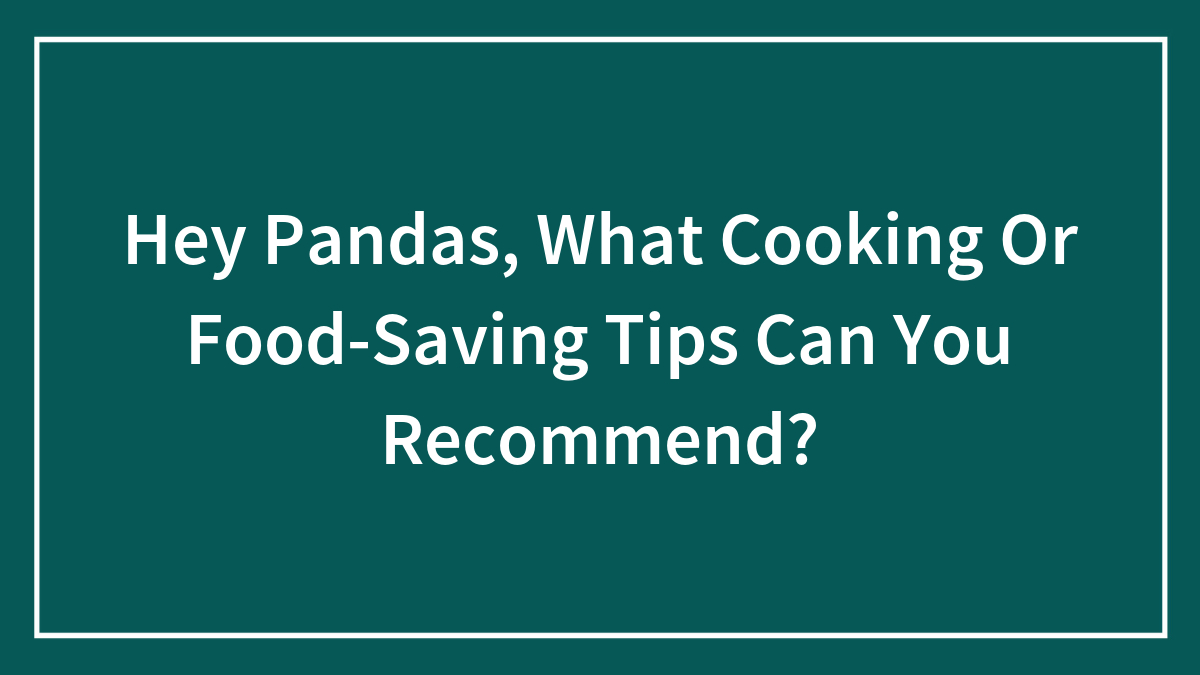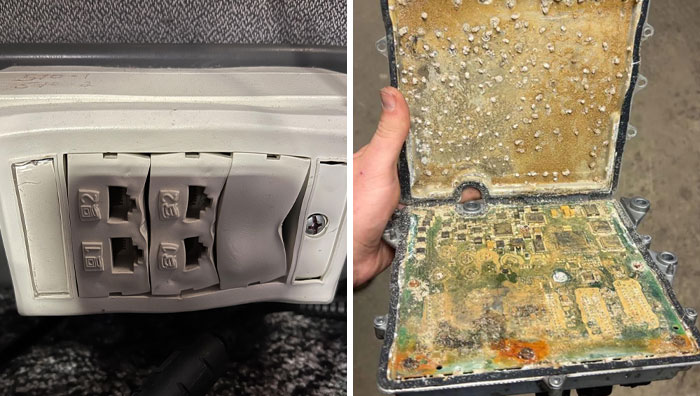As someone who is willing to learn new food preparation or cooking tips, I am fascinated by learning new tips to help save on food.
Post up any tips, tricks, or advice you have here.
This post may include affiliate links.
Here's a fun one I learned recently, which is helpful for those who may not have a vacuum sealer. Put whatever it is you want to "vacuum seal" is a resealable bag (like a Ziploc), and close up the bag, but leave only a 1 inch opening. Then slowly submerge your bagged food in a pot or large container of water. Submerge most of the bag into the water, aside from the open hole, then seal up the bag. Voila, vacuum sealed food. Gotta give it up to YouTuber and former Masterchef contestant Nick DiGiovanni for showing me that trick. Helped with these massive pork chops I wasn't able to cook recently.
I do this, but not using water. Despite smoking my whole life, I have pretty good lung capacity, so I'll put whatever I need to bag into a Ziplock, then sip it about 90% shut. Holding the bag, I use my hands to like push/pinch open the little bit I haven't sealed. Then I exhale deeply, put my mouth over the opening, and slowly, steadily "suck" the air out. Once I'm at the end of my lung capacity, I seal the bag the rest of the way. Course, I live alone so... but, it works out REALLY well for me. I can already hear the arguments. I don't do this with food/ingredients I might share with people, no, ew. Just me. As for germs, I've been doing it for decades and I'm still alive. To each their own.
Buy the brand name ketchup, brown sauce etc that you like. Buy the biggest bottle you can find, more for your money. Splash out on the luxury of the brand you like, the sauce will make any cheap food tasty. Cheap and nasty microwave meals? Rescued with sauce. Only got pasta or rice to eat? Tommy K for the pasta, Brown sauce for the rice.
This just really comes down to knowing about price comparison. Seeing the price for the size, and then comparing it to others. Sometimes it's not worth it, or it just doesn't matter. For example a big bottle of ketchup might only save you something like $.10, as opposed to buying 2 smaller bottles. Learning how to cost/size compare is the main lesson here because sometimes you can REALLY save a lot. But you have to do the math because advertising can be so tricky, you can fall for it if you're not careful.
Gosh, this is such a loaded question because of all the variables. I'll just note down the immediate things that spring to mind. 1.) Well stocked pantry - rice, beans, pasta, oatmeal, baking supplies, spices, oils, stocks/broths, nut/seed butters, canned goods, etc. This is your hoard in rough times, keep it stocked. On average, these things are cheapest to have on hand long term, when compared with spoilage from fresh stuff. 2.) Fresh fruit - especially things like berries and grapes. Some of the best deals you might find, are on these things. Try to process them the day you get them home but if you can't, at least do this - --fill a large bowl with 1 part white vinegar, 3 parts cold water. Dump in all your berries and grapes. Let them sit for about 10 - 15 minutes, stirring/shushing them around. Drain them all into a colander, then rinse under the faucet with cold water for a minute or two. Spread out dish towels or paper towels along your counter top/bench, and spread all of your fruit out. Lightly pat them dry, and let them air dry for 1 - 2 hours. --if you have a salad spinner, BE CAREFUL using this with more delicate berries like raspberries and blackberries. Strawberries, do NOT cut off their tops when you use the vinegar bath. Leave them on. --repackage them if the containers they came in are GOOD - meaning, they have a moisture absorbing pad on the bottom and the container is full of vent slits/holes. Get them back in the fridge, the lowest level, at the back. **if the packaging sucks, you can buy a cheap colander and put a paper towel in the bottom, put the berries on top, and then cover it with either a plate that fits, or cling wrap that you poke holes in the top of. You can also use a big paper bag with holes cut into the top, stored on it's side. --if you have more berries than you can eat, invest in ice cube trays. Since your berries are now clean, cut out the tops of the strawberries, roughly slice them, and put them into a small or large food processor. In my area, a small food processor costs about $15. You might have to do this in batches, and that's okay. Add NOTHING. Pulse the batch until it looks like a jam. --spoon the berries into air cube trays. You can use some light cooking spray if you want, but honestly you DON'T need it. Fill the cubes to the top, then pop in the freezer. Let them freeze for at LEAST 2 hours. Then twist the trays to crack them loose, and store in a big freezer bag. **these come in handy for helping to make smoothies, to toss into your overnight oats, into overnight yogurt, etc. You can just do 1 berry type at a time or you can make blends, etc. Experiment, it's fun! 3.) Potatoes - if you can eat them, these are definitely your friend. Learn the different types. You can get away with using any potato for just about anything, but some types are better than others for certain things. Mashed, smashed, roasted, baked, pancakes, you name it. Keep the skins on if you're able, there's a lot of nutrients in the skins. 4.) Eggs - if you can eat them, again these are definitely your friend. I particularly love "eggs and potatoes" - you can bake or microwave 2-4 small to medium potatoes, fry 2 - 4 eggs to put on top. You can dress them however you like with butter, salt and pepper, french onion dip, etc. I also enjoy mashed potatoes and fried eggs. Colcannon and fried eggs is great. Popovers, Yorkshire pudding, options are endless. 5.) Beans - for this, I don't mean as just a pantry staple. Did you know that you can make "tofu" out of ANY kind of bean? Tofu is traditionally soybeans, but you can make it using chickpeas (chichi beans, garbonzo beans), peas, butter beans, navy beans, etc. Look up recipes! **kidney beans, if dry when bought, need to be soaked at LEAST 24 hours, then drained, then filled with water again and thoroughly cooked. A slow cooker is great for this. If not properly handled, dry kidney beans are toxic. I'll shut up now.
I didn't know that about beans but it makes sense, and I will have to try it with chickpeas, since I can't eat much soy bean
I know it's sounds like such a TikTok trend, but investing in containers for food storage can save you space. You can get them for cheap at your local dollar discount store, like Dollarama, Dollar Tree, Poundland, for example. These clear containers make it easier to see what's left and takes up less space than the factory packaging the food comes with. If you're still lacking space in your cupboards and but are able to stack cans and other short food containers, extra shelving racks can provide double the cupboard space. Keep flour and oats in an air tight container the fridge to prevent them from getting infested with little weevils and other gross insects. (If you're flour is super old it won't work.) Every 6 months or so do a thorough check of all your food. Some foods you thought don't expire do expire, especially if not stored at the proper temperature. Get yourself a spice rack with spice jars, but fill the jars with loose tea, cut out the labels on the packages and stick them on the corresponding jars. I just think it's nicer. Your tea may stay fresh longer, too. I'm painting mine with different plants and fruits, and sticking 3D butterflies on my rack. I have a spice rack I use for spices, too. Makes me feel like a sorceress making potions. :) Freezers are great for preserving. Not all foods can be frozen. You don't put lettuce in the freezer. Check for freezer burn in your frozen vegetables. Plan out your meals, realistically, and allow for snacks, for the week instead of every 2 weeks or the month, and then shop for those items. Allow yourself to have treats. You only live once. You're an adult now. You know you'll give in, anyways. Shopping every week and buying enough food to last the week, will reduce the risk of wasting spoiled food. Go ahead and try different dishes and exotic foods. Experiment. Discover. "Take chances. Get messy. Make mistakes." If you are not sure how to prep/cook it and don't want to bother learning how, don't buy it. Make a point to believe take out doesn't exist, remind yourself how you feel after you eat fast food and that anything take out can be made at home better. Better yet, to ensure you're sticking to a budget, take out the money you originally want to spend and pay for your food in cash. I know, I know. But at least you'll be less enticed to go over budget, and you'll know you have the money in your pocket than worrying about what's been taken out between checking your balance and cashing out than can cause an NSF embarrassing moment. (It happens.) Take cooking classes if you don't have the confidence to cook. If you're only intimidated by the clean up, learn of low kitchen tool use meals.
Invest in at least one really good knife. William Sonoma even will resharpen them for free. Just got it last fall and it is amazing how a really sharp, well made knife improved my cutting skills.
1.) Keep a steady stock of dry goods in the pantry like rice, noodles, pasta, beans, bread crumbs, flour, etc. Also, items like pasta sauce and canned tuna, etc. When money is tight, you can whip up a simple delicious meal for cheap. 2.) Vegetables -- if you have a Costco membership, give the frozen veggies mix a try. It's a good value for a good amount. When you need a quick veggie dish, it's a versatile thing to have in the freezer. 3.) Protein -- Opt for cheaper protein options like ground turkey, ground pork (if you eat pork), tofu, chicken legs/thighs. Try to explore simple, tasty recipes using cheaper protein. 4.) Seasonings -- build an arsenal of dried herbs, sauces, seasoning, bouillon. This allows you to experiment with flavors and new recipes without scrambling to buy something everytime. 5.) One pot meal recipes -- oftentimes, one pot meal will save you time and money by using ingredients you have around the house. One of my favorite go tos is homemade "hamburger helper" using ground turkey, frozen peas, and bechamel sauce as a base. Another favorite of mine is egg fried rice with peas. Sometimes, I also add in leftover protein like shredded rotiserie chicken. 6.) Buy bulk if it's worth it for you. Some items I buy in bulk from Costco are pasta, pasta sauce, canned tuna, peanut butter, frozen veggies, frozen waffles.
Save the cut ends, stems etc from chopping veggies, and bones and trimmings from meat too if you eat it. Simmer them in water to make broth, which you can use to make soup, or to add flavor when cooking rice or pasta
Add a few chopped pickled capers into anything based on tomato sauce. It enriches the flavours and rounds up the dish beautifully 😋

 Dark Mode
Dark Mode 

 No fees, cancel anytime
No fees, cancel anytime 













































